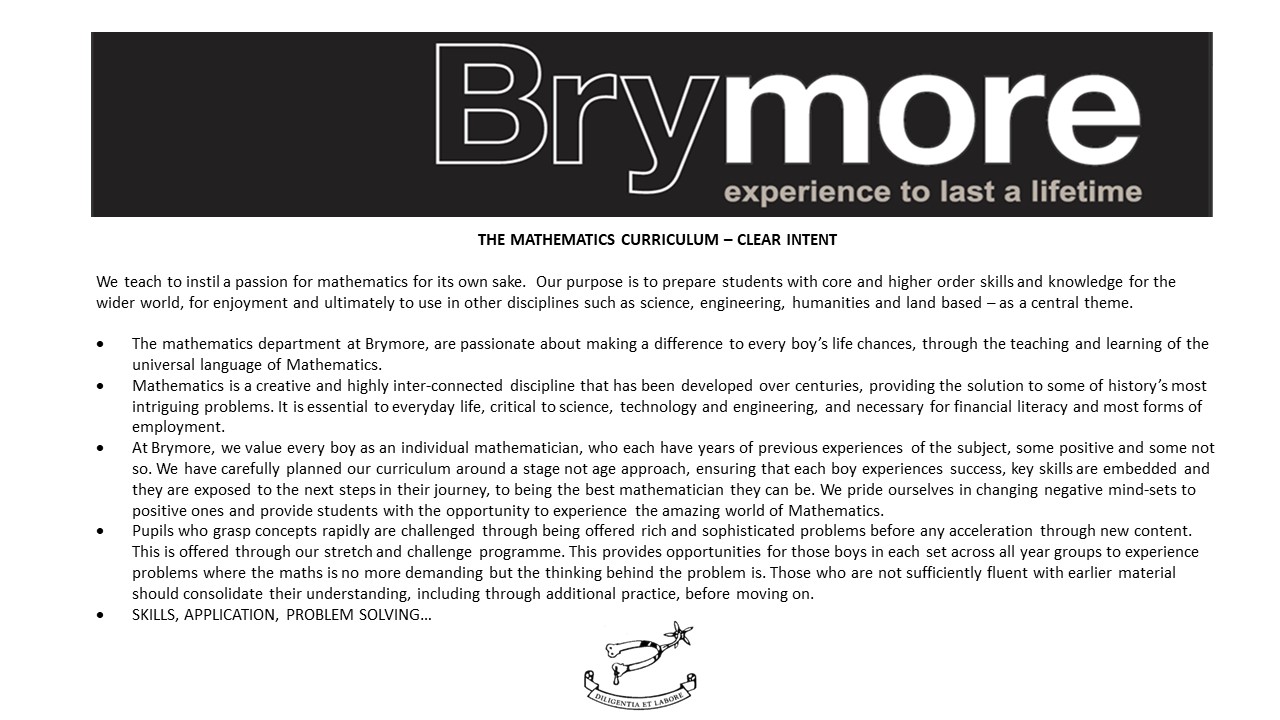MATHEMATICS is the universal language. We believe in deepening the understanding of every student by enriching the learning experience and promoting an enjoyment of the subject. The mathematics department at Brymore, is passionate about making a difference to every student’s life chances.
We teach to instil a passion for mathematics for its own sake. Our purpose is to prepare students with core and higher order skills and knowledge for the wider world, for enjoyment and ultimately to use in other disciplines such as science, engineering, humanities and land based – as a central theme.
We encourage parents to support their sons, by testing them on tables for a few minutes a day in key stage three, engaging with on-line Hegarty Maths and MathsWatch prep by checking results and learning about what has been set before your son asks for help.
Mathematics in Year 7, 8 and 9 (Key Stage 3)
In mathematics we study six areas:
- Number
- Algebra
- Ratio, proportion and rates of change
- Geometry and measure
- Probability and sets
- Statistics
At Brymore, we value every student as an individual mathematician, who each has years of previous experiences of the subject, some positive and some not so. We have carefully planned our curriculum around a stage not age approach thus capitalising on every student’s prior knowledge, revisiting topics to consolidate, to build on and extend previous learning, ensuring that each boy experiences success. Key skills are embedded and students are exposed to the next steps in their journey, to become the best mathematician they can be.
We pride ourselves in changing negative mind-sets to positive ones and provide students with the opportunity to experience the amazing world of Mathematics.
Boys are placed in ability groups, which are regularly reviewed. They are continuously monitored by their teacher and assessed on each topic area covered, then feedback on success and areas of improvement can be personalised. We encourage an enjoyment of the subject through competition and making use of our inspiring surroundings. Mathematics is a creative and highly inter-connected discipline that has been developed over centuries, providing the solution to some of history’s most intriguing problems. It is essential to everyday life, critical to science, technology and engineering, and necessary for financial literacy and most forms of employment.
What will GCSE maths be like?
We use the 9-1 GCSE Edexcel Linear course; culminating in three written examinations in year 11, which consist of one non-calculator and two calculator papers, each is ninety minutes long. Students learn to analyse and solve problems using skills and concepts, from the six strands listed above.
Students in set 1 study the higher tier syllabus (grades 9 to 4) and sets 2 and 3 study the foundation tier syllabus (grades 5 to 1).
Pupils who grasp concepts rapidly are challenged through being offered rich and sophisticated problems before any acceleration through new content. This is offered through our stretch and challenge programme which provides opportunities for those boys in each set, across all year groups to experience problems where the maths is no more demanding but the thinking behind the problem is. Those who are not sufficiently fluent with earlier material will consolidate their understanding, including through additional practice, before moving on.
Extra-curricular opportunities for stretch and challenge outside of lessons include ‘Set Zero’, where year 10 and 11 students enjoy enrichment activities beyond GCSE as well as studying grade 8 and 9 topics. A similar opportunity for year 7, 8 and 9 students is ‘Lead Learners’ providing for those higher ability students who have the potential to exceed their target. Students regularly attend extra maths sessions after and sometimes before school, pushing themselves to reach their full potential.
Boys are continually assessed using GCSE style questioning, aligned to the topic being studied, from years 7 to 10 at the end of each half-term and, using formal mock examinations throughout Key Stage 4. Expectations are high; students must improve their grade term by term to arrive at their examination confident to achieve their target grade or more.
Head of Mathematics: Mr I Ashton




